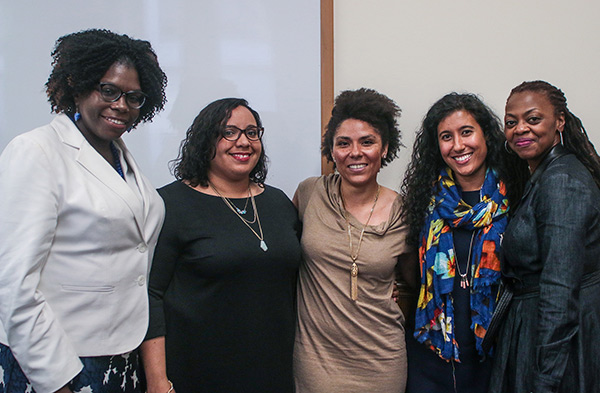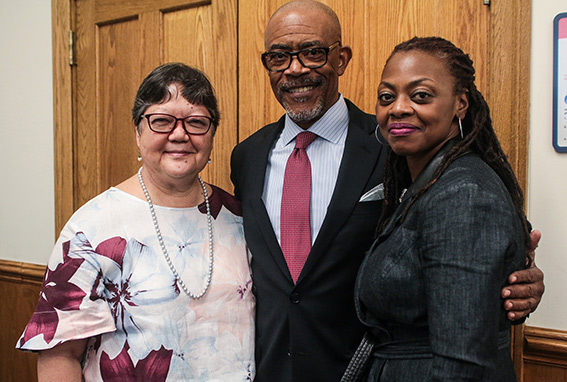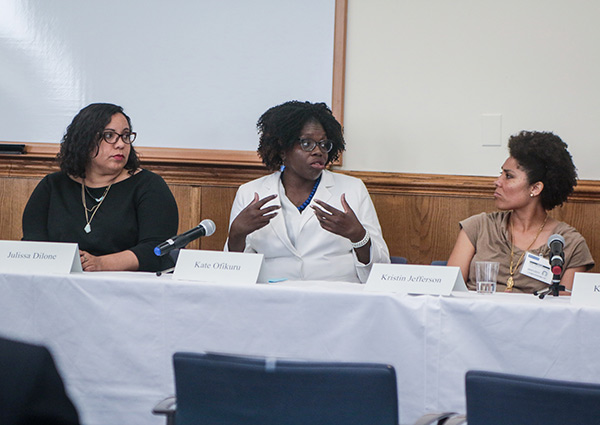Preparing and Supporting Teachers of Color: The relaunch of a program aimed at recruiting more teachers from underrepresented groups

The question, put to a panel of four New York City teachers of color in early June, brought murmurs and applause from a Teachers College audience of mostly African-American and Latina/o preservice students.
The panelists – all TC alumni – glanced at each other, and then Kristin Jefferson (M.A. ’08), an elementary school teacher at a charter school in Brooklyn, leaned forward.
“My kids are joyful, and so am I,” Jefferson said, adding that all her students are of color. “The culture at my school is ‘If I say it, you do it’ – and if you’re not angry at the kids, there’s something wrong with you. And this isn’t a white-staffed school – most of the administration are black and Latino. But when I hear us being complimented for making our black and brown babies quiet and compliant, I say, ‘No!’ I want them to react to everything.”
Jefferson and Malik were among the speakers in early June at a launch event for Teacher Opportunity Corps (TOC II), a program to recruit people from racially underrepresented groups into the teaching profession.
“There’s something called insider knowledge. You may not find it in the research, but there’s something about looking at young people and being able to know how it feels to be them. What we’re hoping is that this program will produce more teachers who understand that.”
— Lester Young
Created during the mid-1980s, TOC responds to an imbalance in America’s public schools: Just 18 percent of teachers are persons of color (and only 2 percent are black males), in contrast to a majority of students of color.
In his keynote address, Lester Young, a member of the New York State Board of Regents who chairs My Brother’s Keeper, explained why those numbers are cause for concern.

Citing the late Africanist and educational psychologist Asa Hilliard, Young said that the role of teachers is “to liberate young people by caring about them, by respecting them, by knowing something about who they are and how they learn, which is a very different kind of task than understanding pedagogy and content.” And when it comes to liberating students, he said, “there’s something called insider knowledge. You may not find it in the research, but there’s something about looking at young people and being able to know how it feels to be them. What we’re hoping is that this program will produce more teachers who understand that.”
Young chairs My Brother’s Keeper, a New York State initiative through which TOC II is funded – thanks in part to testimony by TC’s Yolanda Sealey-Ruiz, Associate Professor of English Education who leads the TOC II-mandated seminar for perservice middle and high school teachers. An important new feature of TOC II is the requirement that preservice teaching students fulfill a 10-month internship in high-need schools. The ultimate goal is to bolster the retention rate by providing teacher candidates with a stronger clinical experience and strong mentors in the partnership schools.
The Office of Teacher Education at Teachers College has been awarded a five year TOC II grant by the New York State Education Department. Funding for the program is also being supported through a gift from the late Trustee Emerita Abby M. O'Neill. TC has been a frequent recipient of the original TOC grant since the program’s inception in the 1980s.
“Every child seen to have limited language, from a deficit perspective, is multilingual, if we just change the way we see them.”
— Mariana Souto-Manning
Echoing Young, Mariana Souto-Manning, TC Associate Professor of Early Childhood Education, added that teachers of color can “provide mirrors for children to see themselves” and “windows so that all teachers become more culturally competent, avoid racism and misogyny, and see the possibilities for and brilliance of children of color.”
Souto-Manning, who leads the TOC II-mandated seminar for preservice teachers in early childhood and elementary education, said that in New York City and New York State, “which figure among the most segregated school systems in the country,” these aims are especially important. For example, she said, “Every child seen to have limited language, from a deficit perspective, is multilingual, if we just change the way we see them.”

The panel discussion led by the four TC alumni – all of whom are graduates of the first iteration of the original TOC grant – confirmed that assessment, describing the sense of hope and possibility felt by teachers of color committed to racial justice when they are cultivated and supported.
When one black male preservice student said he felt that administrators at his school didn’t take him seriously as an educator – that they seemed to value him mainly as someone who could keep order by taking on lunch and yard duties – heads were nodding all around the room.
“A lot of the students have shown me respect, but a lot of my colleagues look at me as being good with classroom management because I was the one keeping order in keeping with the expectations of the school. So I am dialing it back a bit, and the kids appreciate it.”
— Kate Ofikuru
Panelist Kate Ofikuru responded by sharing her strategy for pushing back.
“A lot of the students have shown me respect, but a lot of my colleagues look at me as being good with classroom management because I was the one keeping order in keeping with the expectations of the school,” said Ofikuru, a 5th grade ICT special education teacher and a Reading Interventionist for “at-risk” students at a charter school in Queens. “So I am dialing it back a bit, and the kids appreciate it.”
All the panelists urged their listeners to seek out schools with administrators who care about the wellbeing of all teachers and who support the development of teachers of color committed to teaching for justice.
“Don’t just jump at the first job,” said Ofikuru. “If I could go back, I’d tell 2008 Katie, ‘Make sure wherever you go, there’s a support system of people who are genuinely interested in your development. So find a school not just where the administrators look like you, but where they believe in you.”
“Make sure you’re going into a collaborative environment,” said Julissa Dilone (M.A. ’12), a sixth-grade teacher and humanities department chair at a school in the Bronx. “Observe for a day – if you can’t do that, it’s not the right school. Don’t be afraid to ask, How are you going to support my growth? What plans do you have in place for first-year teachers? For five-year teachers? For ten- and 15-year teachers? Because things can get stale and you want to keep learning new tricks.”
Dilone also had advice for another preservice teacher whose school discouraged her from initiating discussions of the nation’s racial climate and other highly charged, headline-making issues.
“After the election, when my kids were in tears, I found a website, What Does It Mean to Be an American, and I started a conversation around that,” she said. “I made sure it was aligned with the Common Core. The conversation led to a discussion of the electoral process and then I found an article on that.”
“So I love the term ‘supplemental,’” she said, to laughter. “It gives you a way to present what you’re teaching as meeting the criteria your administration is expecting. And that gives you control over your curriculum.” – Joe Levine
Published Wednesday, Jul 12, 2017